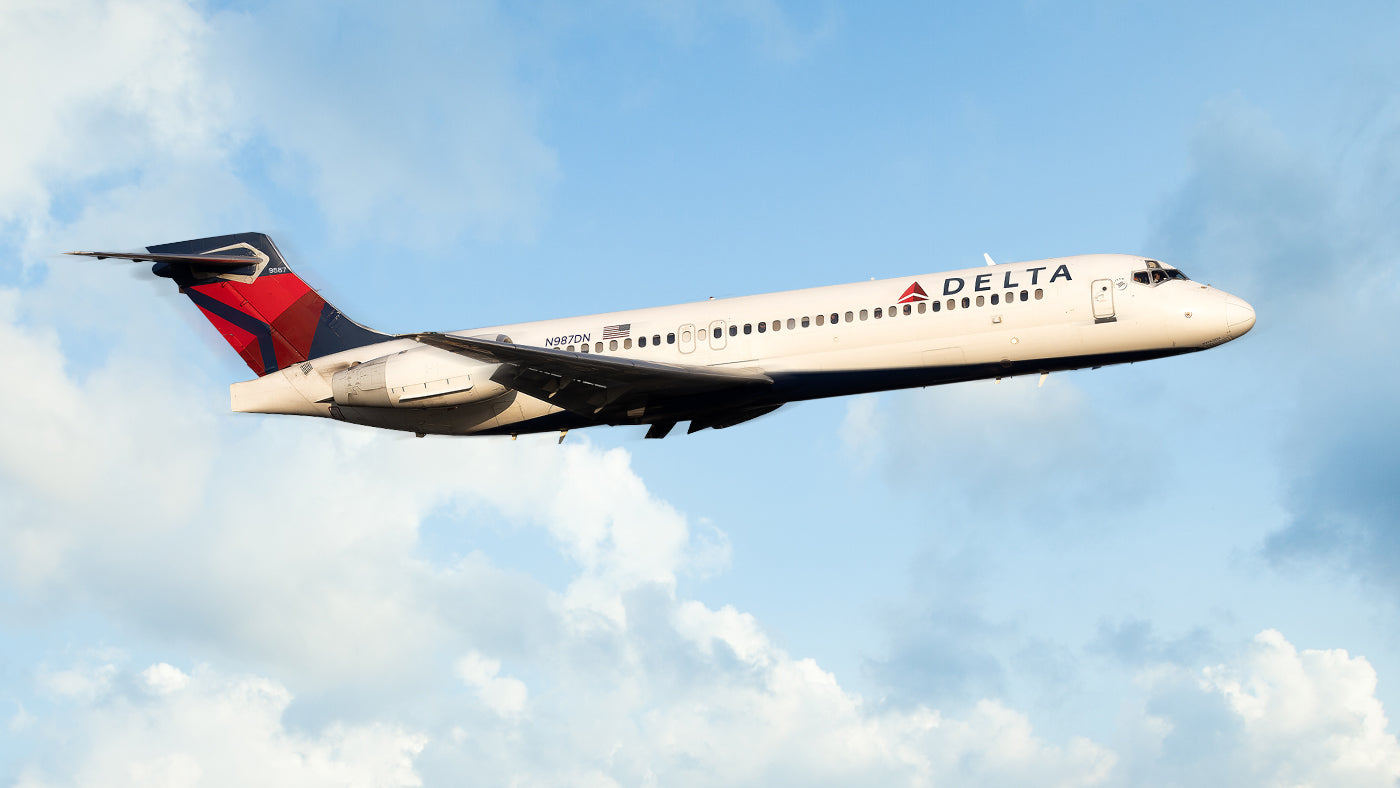
- by Dianna Lopez
From Delta Air Lines to Your Collection: Boeing 717 PlaneTags
- by Dianna Lopez
A question? Visit our contact page
This site uses cookies for better user experience and analytics.

Embark on an exciting journey into the world of commercial aviation as we delve into the story of the Boeing 717. PlaneTags, in collaboration with Delta Air Lines, is unveiling a new Boeing 7-series PlaneTags release on April 4, 2024, and we invite you to explore the rich history and enduring legacy of this iconic aircraft.

The Boeing 717 is a commercial jet airliner developed by McDonnell Douglas, which is now a part of Boeing. Originally known as the McDonnell Douglas MD-95, it was rebranded as the Boeing 717 after Boeing acquired McDonnell Douglas in 1997. The aircraft is designed for short to medium-range flights and typically seats around 100 passengers in a two-class configuration. 156 were built.
The Boeing 717 features a twin-engine configuration and is known for its efficiency, reliability, and low operating costs. It is often used by regional airlines and low-cost carriers for domestic and regional routes. With its compact size and versatility, the Boeing 717 is well-suited for serving smaller airports with limited runway lengths and facilities.
Despite its smaller size compared to other Boeing models like the 737 or 757, the Boeing 717 offers passengers a comfortable flying experience with modern amenities and features. Its spacious cabin layout and relatively quiet operation make it a popular choice for both passengers and airlines alike.
Overall, the Boeing 717 remains a popular choice in the aviation industry for its reliability, efficiency, and suitability for short-haul flights, making it an integral part of many airlines' fleets around the world.
The development of the Boeing 717 traces back to the early 1990s when McDonnell Douglas sought to fill a niche in the market for a modern, efficient, and cost-effective short-haul airliner. McDonnell Douglas aimed to capitalize on the growing demand for regional jet aircraft capable of serving smaller airports and thinner routes with lower passenger volumes.

Initially designated as the MD-95, the project began as an evolution of the McDonnell Douglas MD-80 series, incorporating modern technologies and design enhancements to improve fuel efficiency, reduce operating costs, and enhance passenger comfort. The MD-95 project aimed to leverage existing infrastructure and expertise within McDonnell Douglas while offering airlines a more economical and versatile alternative to larger narrow-body aircraft.
The design process of the MD-95 involved extensive collaboration between McDonnell Douglas engineers, aerodynamicists, and airline customers to tailor the aircraft to meet the specific requirements of short-haul operations. Key design features included a twin-engine configuration for improved fuel efficiency and reliability, advanced avionics systems for enhanced cockpit capabilities, and a spacious cabin layout to maximize passenger comfort and accessibility.
As the development of the MD-95 progressed, McDonnell Douglas faced financial challenges and ultimately sought a partnership to ensure the project's viability. In 1997, Boeing announced its acquisition of McDonnell Douglas, which resulted in the rebranding of the MD-95 as the Boeing 717.
With Boeing's support and resources, the Boeing 717 program continued to advance, leading to the certification and entry into service of the aircraft in the late 1990s. The Boeing 717 inherited the qualities of its predecessor, offering airlines a versatile, economical, and reliable solution for short to medium-range operations. Despite facing competition from other regional jet manufacturers, the Boeing 717 carved out a niche in the market and enjoyed success with various airlines worldwide, cementing its legacy as a capable and efficient airliner for regional routes.

The Boeing 717, initially introduced by McDonnell Douglas and later integrated into Boeing's lineup, has served as a dependable workhorse in the commercial aviation industry since its inception. First taking flight in 1998, the 717 quickly became a staple for regional and short to medium-haul routes, renowned for its efficiency and reliability.
Delta Air Lines operates the Boeing 717 primarily on domestic routes within the United States. The aircraft is commonly deployed on short to medium-haul flights, serving various destinations across Delta's extensive network. Some of the key routes where Delta utilizes the 717 include connections between major hubs such as Atlanta, Detroit, Minneapolis, and Salt Lake City, as well as flights to smaller regional airports and leisure destinations.
In addition to hub-to-hub routes, Delta also operates the 717 on routes connecting smaller cities and towns, allowing passengers to access Delta's vast network of destinations with convenient connections. The flexibility and efficiency of the Boeing 717 make it well-suited for serving these routes, providing reliable service to communities of varying sizes across the country.


Photo by Ken Fielding, used with permission
Our Boeing 717, the 37th of its kind among a total of 156 aircraft, boasts a rich and diverse history. Taking to the skies for the first time in July 2000, it embarked on a journey spanning various airlines and continents. Initially delivered to Bangkok Airways as HS-PGP in November 2000, it later transitioned to serve Spanair as EC-KNE in February 2008, followed by Blue1 as OH-BLP in January 2011. Finally, in January 2016, it found its home with Delta Air Lines under the registration N987DN, becoming an integral part of their fleet, until retirement in late 2020. In 2024, MotoArt had the opportunity to create PlaneTags from the original skin of N987DN.
 Photo by Ken Fielding, used with permission
Photo by Ken Fielding, used with permission
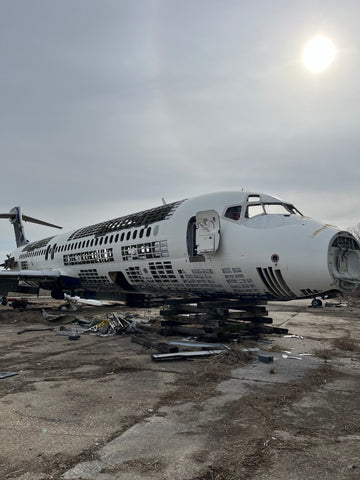
Finding a Boeing 717 had been a challenge for MotoArt PlaneTags owner Dave Hall. Only 156 were built and many are still in service. Through MotoArt's close relationship with Delta Air Lines, N987DN was made available to further complete the historical documentation of the airline's fleet and to raise money for the Delta Care Fund.
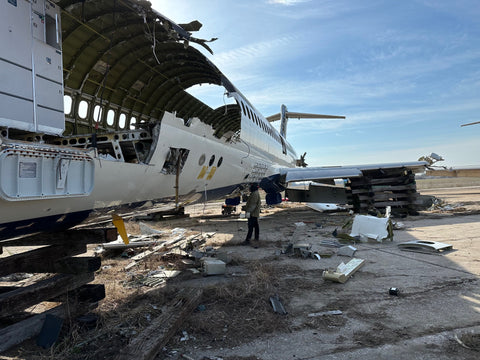
"We're thrilled to have found a Boeing 717 - we're trying to catalogue the whole Boeing 700 series of planes and this brings us one step closer," says MotoArt PlaneTags owner Dave Hall. "This one is pretty special. It flew with different carriers around the world before it became a Delta plane so it represents a lot of history."
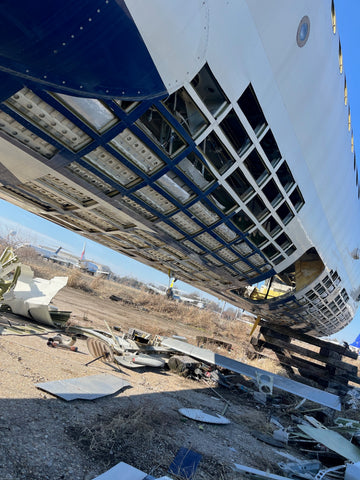
The Delta Care Fund is a charitable initiative established by Delta Air Lines to support employees facing financial hardship due to unforeseen circumstances such as illness, injury, or natural disasters. It provides financial assistance and resources to eligible employees and their families during times of need, helping them navigate challenging situations and maintain stability in their lives. The fund reflects Delta's commitment to caring for its workforce and fostering a supportive community within the company. Portions of the proceeds from all Delta branded PlaneTags are contributed to the Delta Care Fund.
Other Delta PlaneTags which contribute to the Care Fund include:

Delta Boeing 717 PlaneTags will be available beginning Thursday, April 4, 2024 at planetags.com. They are numbered in a series of 7,500 and will initially be available in solid colors of blue, white, dark red and light red, as well as various color combinations and composite material.

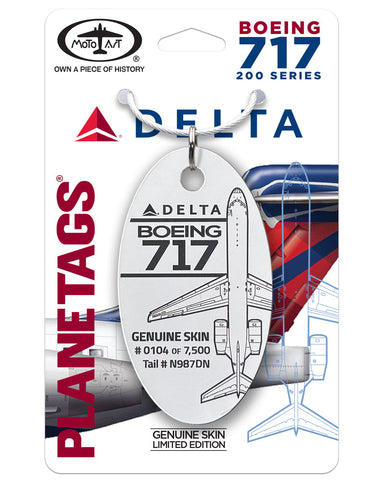
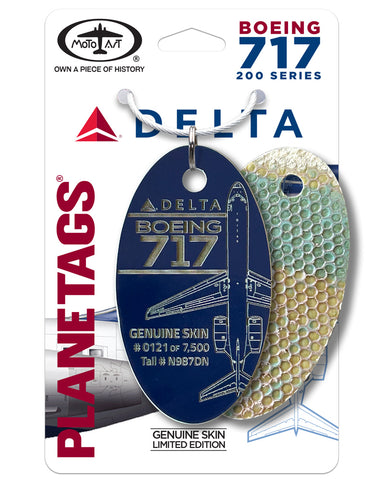
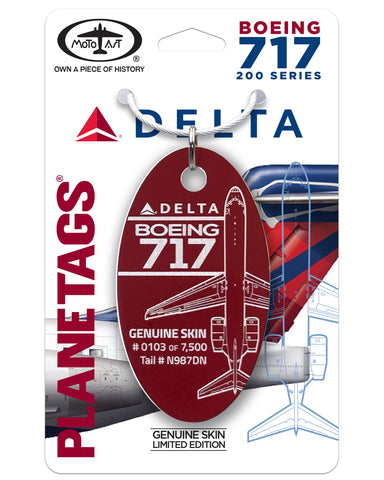

Now’s your chance to assemble your Boeing 7 series PlaneTags collection, beginning with the Boeing 707 through Boeing 777.
Don’t miss these best selling Boeing PlaneTags - get them before they are sold out.
From Warbird to Water Bomber: The Epic Life of the Hawaii Mars
In the world of aviation, few aircraft have lived a life as large, or as long, as the Hawaii Mars. Towering over most of its contemporaries with a wingspan of 200 feet, this mighty flying boat was born in the final days of World War II, then quietly transformed into one of the most iconic aerial firefighting aircraft the world has ever seen. From military transport to firefighting titan, the Hawaii Mars represents one of aviation’s most extraordinary second acts.
In 2025, MotoArt obtained an original wing of this aircraft and created special PlaneTags, made exclusively for the Martin family members and Mars workers. On December 11, 2025, Hawaii Mars PlaneTags will be available to the general public for the first time.
F-14 Tomcat Coasters: A Legendary Fighter Reimagined for Your Home
Few aircraft define an era quite like the Grumman F-14 Tomcat. Sleek, powerful, and unmistakably iconic, the Tomcat was the Navy’s premier fleet defense fighter for more than three decades. From Cold War missions to pop culture stardom, the F-14 remains one of the most recognizable and beloved aircraft ever built. Today, MotoArt is proud to introduce the F-14 Tomcat Coaster Set, created from authentic F-14 aircraft material.
PR-AJB: The Story of an Azul Airbus A320 With a Global Journey
Every airplane has a story, and some travel farther than others before their flying days are over. PR-AJB was one of those well-traveled aircraft. This Airbus A320 started its life flying British families on long-awaited holidays, then later crossed the Atlantic to join the growing fleet of Azul Linhas Aéreas Brasileiras. Over nearly nineteen years it picked up new registrations, new paint, new routes and a new home, carrying thousands of passengers along the way.
Its journey reflects how widely the A320 family has spread around the world and how easily these aircraft adapt to whatever their next chapter requires. PR-AJB also arrived at Azul during an important period of expansion as the airline worked to connect more cities across Brazil. In this blog we will explore where the aircraft came from, what it did during its short time with Azul, and how it eventually came to rest in Florida. We will also share how MotoArt recovered material from the retired airframe and created PlaneTags so its story can continue in a new way.


Share:
Hawker Hunter T7: A Sleek and Agile Trainer
Soar Above the Clouds: Experience the April 8 Eclipse with Delta Air Lines and PlaneTags